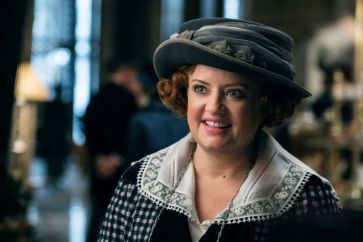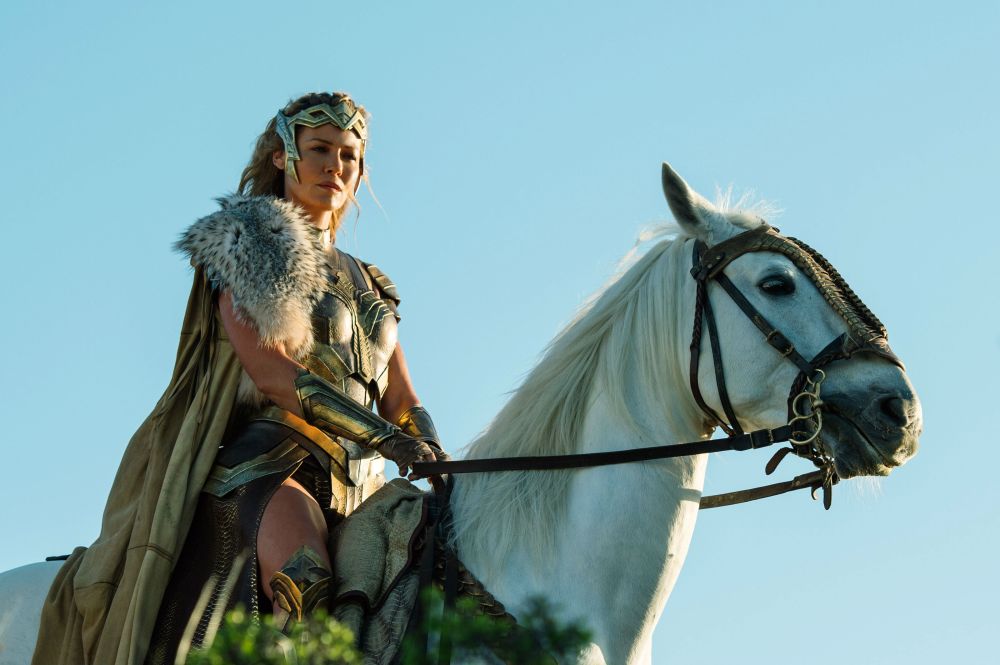4.5 out of 5 stars.
“Wonder Woman” is the most important blockbuster movie of the year; actually, it’s one of the most important movies not just of 2017 in general, but in recent years. Film and television mediums have been dominated in recent years by superhero movies, but from Marvel’s now-massive cinematic universe to the one Warner Brothers has been building up for DC over the last few years to everything in between, none of those films have centered around a female superhero. In fact, the last (and only) female hero films that spring to mind are 2004’s “Catwoman” and 2005’s “Elektra,” and as we should all ignore the existence of both of those, they don’t really count.
That all changes with “Wonder Woman,” the newest installment of DC’s cinematic universe that puts the spotlight on the character, who was first introduced in comics in 1941. It not only has a female lead, but it also breaks ground by having a female director, Patty Jenkins. And not only that, but it’s also a genuinely great movie, one that gets away from the overwhelming dystopian depression of “Batman vs. Superman,” “Man of Steel,” and “Suicide Squad” to instead deliver a funny, action-packed, and, most importantly, thoughtful movie with a compassionate hero.
The character Diana Prince, aka Wonder Woman (played by the marvelous Gal Gadot), was introduced in “Batman vs. Superman: Dawn of Justice” last year in a supporting role. That film revealed an old photograph of Diana with some World War I era troops on a battlefield, and her receiving that photograph in the present day serves as a framing device for this movie, which takes us all the way back to the early 1900s to tell that story. We get a glimpse of Diana’s childhood on Themyscira, an island of women hidden from the world for protection from Ares, the god of war—all Amazons, except for Diana, whose mother, the queen Hippolyta (Connie Nielsen), sculpted from clay and asked Zeus to bring life to her. Diana grows up training with her aunt and the Amazon army’s general, Antiope (Robin Wright) to become the best warrior possible, which comes in handy when a pilot named Steve Trevor (Chris Pine) crash lands on Themyscira.
It’s at this point where we really see how purely good Diana’s intentions are. When she learns from Steve about the massive war raging in the outside world, her first instinct is the opposite from her mother, who is primarily concerned with self-preservation. Diana is willingly to leave her family, her people, and everything she’s ever known behind forever because there are innocent people who need help. And she does just that—she travels with Steve (who is as it turns out is a spy for the Brits) to London, where she gets her first taste at modern human society, complete with a makeover aided by Steve’s trusty (and funny) secretary Etta (Lucy Davis).

Up to this point, the movie has been relatively light on the action side as it fills in Diana’s backstory, but it’s never uninteresting. The Themyscira we see is populated by a diverse group of women who are capable not just of incredible physical feats, but are also intelligent, can speak many language, and are aware of and educated on much of the outside world even though they remain apart from society. And in London, Diana is charmingly captivated by everything she sees, hears, and tastes, from a baby (there are no children on Themyscira) to an ice-cream cone. But finally, Diana and Steve make their way to the front lines of the war (Diana convinced that the German General Ludendorff could actually be Ares, and that killing him would end the fighting), and we get to see Wonder Woman in all her glory as she takes out German troops left and right with seemingly no effort whatsoever. Jenkins does a nice job shooting the fight scenes here, letting the camera follow Diana’s movements so there’s a good flow to the action without too many cuts.

“Wonder Woman,” as with most superhero films nowadays, concludes with a bombardment of CG effects that is nearly overwhelming, but is fine here due to the strength of Galdot’s performance as well as the compelling supporting players. Pine has found one of his strongest roles to date in Steve Trevor, a man whose desire to do the right thing is often squashed due to the politics of war—that is, until he meets Diana. Their crew is rounded out by a bunch of Steve’s misfit friends, soldiers and spies played by Said Taghmaoui, Eugene Brave Rock, and Ewen Bremner. They don’t have fleshed out backstories, but they actually don’t need them here; just a couple lines of dialogue from Taghmauoi and Rock’s characters tells us of the obstacles they’ve encountered in life because of their race, while Bremner’s Scottish sharpshooter talks the talk but has trouble doing his job due to PTSD. Davis’ Etta and David Thewlis’ Sir Patrick Morgan round out the supporting cast, while Danny Huston’s Ludendorff and Elena Anaya, who plays the skilled chemist Dr. Maru, who works with Ludendorff to create gas weapons for the German army, are appropriately creepy villains who could easily have come off as corny had the writers taken a different approach.
But this movie really belongs to Gal Gadot, who seems born to play Wonder Woman. Her all-too-brief introduction in “Batman vs. Superman” left the impression that she would make a great Wonder Woman, but I don’t think any of us knew how true that would be until this film. She doesn’t just resemble the character, and she isn’t just fierce in the action scenes. She is compassionate; she cares about people, all people, and the world, and puts them before herself. We see this in the scene I mentioned before, when she readily charges into a world she doesn’t know and a war she has almost no knowledge of so she can save lives. This is a recurring theme throughout the film, as Diana is heartbroken looking at wounded soldiers, and devastated to see deaths that she feels she could have prevented. This feels entirely different from, say, “Man of Steel” or “Batman vs. Superman.” In those films, the primary objective was defeating a big bad guy; the entire focus was on the heroes vs. villains, or heroes vs. heroes, with countless innocent lives obviously being lost in the process but going unacknowledged. In “Wonder Woman,” there’s still a big bad guy, but the primary goal is to save lives; defeating that bad guy is the way to go about it, but the film never loses focus on what it’s really about: humanity.
The characters and story also work well in the period setting, all factors contributing to make this The pounding score is exhilarating, the cinematography is lovely, giving us everything from the colorful paradise of Themyscira to the dreariness of London to the bleakness of the front lines, and the script is on the whole much more light-hearted than what we’ve seen from DC recently (there’s a lot of good humor and clever dialogue throughout) and much more optimistic. “Wonder Woman” movie reminiscent of old war movies, and also feel much closer to older superhero films, like Richard Donner’s “Superman,” as opposed to the current state of the DC film franchise. The setting also provides more of an outlet for the story’s feminist angle, as Diana has to contend with a world and a time period where women weren’t allowed to vote yet, much less fight in wars, (but she’s not just proving to the men that she can do this; more importantly, she’s proving it to herself). It would be interesting to see how the concept of a female hero is addressed in future films like “Justice League” in which Wonder Woman is living in the modern world, a world that, as anyone who spends more than five seconds on Twitter can see, is still largely opposed to the concept of female-led action movies. But for now, we can rejoice in the fact that “Wonder Woman” and her director have made history, and that maybe, amongst all the noise of multiple universes and crossovers and franchises, the simple yet pure concept of a superhero who truly cares for the world, who possesses all the traits that attracted comic book readers and moviegoers to superheroes in the first place, hasn’t been lost.
Runtime: 141 minutes. Rated PG-13.
I saw the movie and it was very good. I enjoyed the Diana Prince character. As you imply it will be interesting to see how she is changed or not from WW1 to present time. Great review, than you. JC
LikeLiked by 1 person